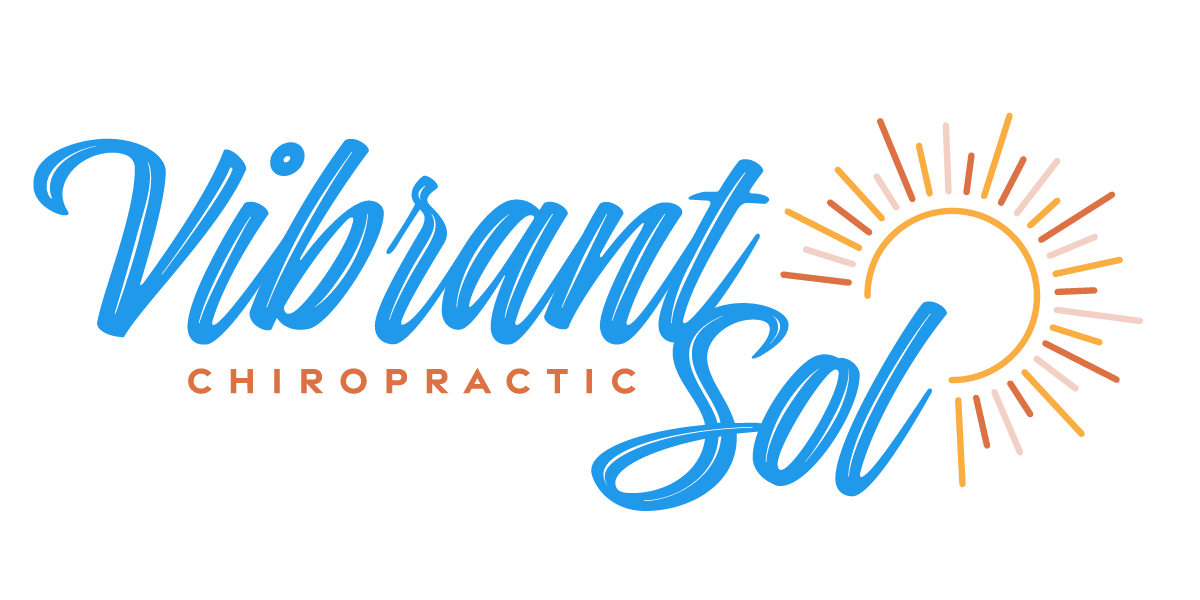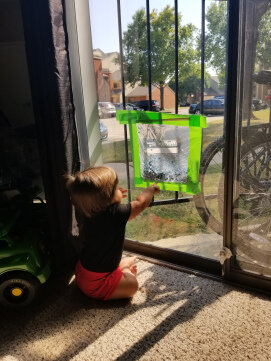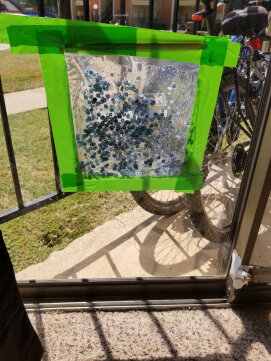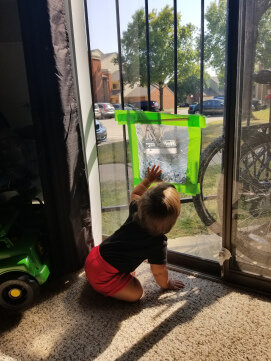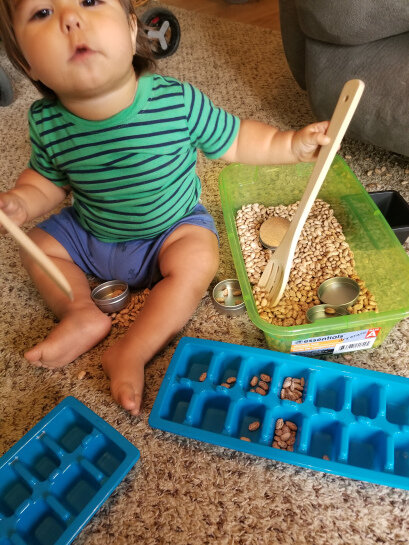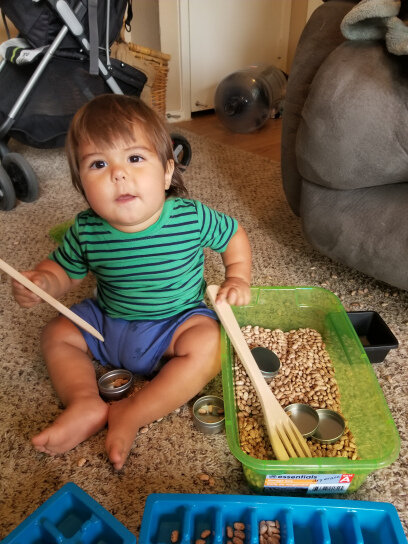That Makes "SENS-ory"
Having children is such a life changing perspective… it gives you a different understanding about life. For one, it is no longer just about ME and MY wants or needs… it's about this beautiful little child and all HIS wants or needs. It has been so cool and such a blessing to be able to apply my own clinical experience into real “at home” activities that help my family's lives stay peaceful…. LETS GET REAL, parenting is tough! It is challenging and growing and sometimes it hurts… when you combine hormones with sleep deprivation and a dirty house it is enough to make any “sane” person go bonkers...Every single challenge and tear is worth it when you get to watch this little person grow so fast and learn so many new things. Every parent has those moments when you think/say, "HOLY CRAP is this (fill in the blank) normal?" and you frantically search google, call your parents/friends/colleagues with questions. I love the spiritual growth I have gained from becoming a parent and thank God every day. Thanks to this new human I get to play, crawl in the grass, sit in the pebbles, play in the sand, blow bubbles, and I always have someone to talk to no matter where I go. 😊 Now you don’t need a child to do all of these things! Actually, thanks to my husband (if you don't know him... rarely will you meet someone who doesn't fall in love with his child like loving nature) who has helped bring out the kid in me, I hope I always stay a kid at heart! <3
A great passion of mine has been to connect everything I have been learning in my functional neurology studies and my clinical practice with children….And now at home with my own kiddo.
I think most people would agree that sensory development is very important.
What is sensory? The Latin for sens- is “perceive”. Therefore, sensory is just that, our perception of the physical senses: touch, taste, smell, sight, and sound. These are the basic examples of sensory. We also have different types of sensory inputs that we are minimally aware of occurring all of the time. For example, your inner ear sensory system is telling your brain right now where your head is in space and is calculating all of that information constantly.
The brain has the most neuronal connections as a baby and during childhood. As the brain develops, more mature and specific connections start to become efficient at certain tasks. Therefore, more specific activation to these neurons equals more specific connections being made.
What are some sensory exercises we can do to facilitate our baby's growth that allows them to explore the world…
One “step” would be letting them step without shoes, especially when they are learning how to walk. Letting babies walk without shoes helps send more information to the cerebellum (balance and coordination) and higher centers of the brain. One way to think is the more textures you can provide for the hands and/or feet, the better.
Next, let them touch everything… within reason… I am not saying let them play with knife as a baby (I’m saying this for Ross…) People tell me all the time “I can’t believe you are going to let him crawl around on this floor”. Research has shown that kids who eat dirt have better immune systems and kids who touch more “stuff” and explore their surroundings have more neuronal connections.
Encourage crawling for as long as possible… Even if it is you getting down on all fours and playing follow the leader or chase, just try to get them to crawl. I know some kids who just want to walk and don’t have time for that crawling business :).
(Yes there is a mattress and blanket tents in the living room :))
Try stacking pillows or building little obstacle courses where they are forced to climb over things to get around. Crawling builds strong mid-line connections in the brain and helps develop proper core and truncal stability/strength for a healthy spine and brain in the future. The cross crawl pattern itself involves complex firing of neurons together. This cross crawl pattern is also important later in life when it comes to “copy/pasting” tasks. Meaning, looking at the chalkboard and then writing what you see onto paper. This is in part due to the primitive symmetrical tonic neck reflex.
Creating a sensory encouraging environment. (Some of my sensory games are a little questionable with a toddler that puts everything in his mouth… therefore all of these games are under adult supervision 😊.) Pinterest is the BEST!!! Most of my sensory game ideas came from there. Paxton loves twisting tops, taking lids off, pretty much playing with anything that is not a "toy". So we bought some containers from Dollar Tree and spent about $20 on all these sensory games.
Learning colors with paint bags- Okay…. Soooo Ross was entertained by this more than Paxton 😊 ( No... Really... He probably sat there for 30 to 45 minutes.)
Sensory Squish bag- Paxton liked this more than paint, but again I'm pretty sure Ross enjoyed it more… hahaha…
Bean bucket… This was questionable… Paxton loves to play in the pebbles outside our house and he puts rocks in his mouth, but very nicely spits them into our hand when we ask. So I thought a bean bucket was still a good idea, but we have found a couple beans in his poo. Of course this was super messy so I have to vacuum after, but it was an awesome game for a good hour… which is awesome when you see this chart of a toddler attention span.
Tiny insect and animal tub- I learned this interning at the Brain Balance Center. It's a cool and simple activity, just dump out a ton of small objects to encourage fine motor skills and is perfect practice for pincer grip. Also identifying the object helps vocabulary.
Cotton balls- we went to visit some friends a couple weeks back and they had this silver antique container with a flip down lid full of cotton swaps and Paxton loved that better than any of the baby toys around. So I got the plastic tub with a twist lid full of cotton balls for him to pull out… again great for developing fine motor skills. (Don't have a pic for this)
Touching and tasting foods- In the beginning, introducing foods is all about experimenting different tastes and textures. We probably waste more food than he actually consumes.
SLIME- ?!?!?! Literally, as I am putting this blog together my best friend's daughter decides she wants to makes slime... AHHHH... at first I think, "Can you wait for your mom?" lol... BUT nope, it is all about that SENSORY input so we made some for everyone to enjoy! It was actually a lot easier than I expected.
Chiropractic Care- This isn't exactly a game... but most of the kids really enjoy going to the Chiropractor... "The brain grows from the brain stem, the least complex area, to the cerebral cortex, the most complex." (1) The brain grows because of the input from our outside world. If there is a subtle birth trauma or an obvious trauma the input from your body to your brain will be altered. A Chiropractor is trained to find these areas in the spine and help correct them. Every birth has it's own set of trauma, and actually research has shown that an average of 60-90 pounds of pressure is applied to the cervical spine during birth. Therefore, every child should be checked by a Chiropractor. :)
These are just a few of the many things we have tried… Some were epic fails, but let your inner child come out and play with some of these fun ideas. If there is anything you have tried personally or thought was cool, please comment below!
Happy Playing! Love you all!
References: (1) https://books.google.com/books/about/Disconnected_Kids.html?id=97SXj6eurLcC&printsec=frontcover&source=kp_read_button#v=onepage&q&f=false(2) https://www.ncbi.nlm.nih.gov/pmc/articles/PMC3400202/(3) http://www.mckillicanchiropractic.com/subluxation-at-birth-the-effect/
